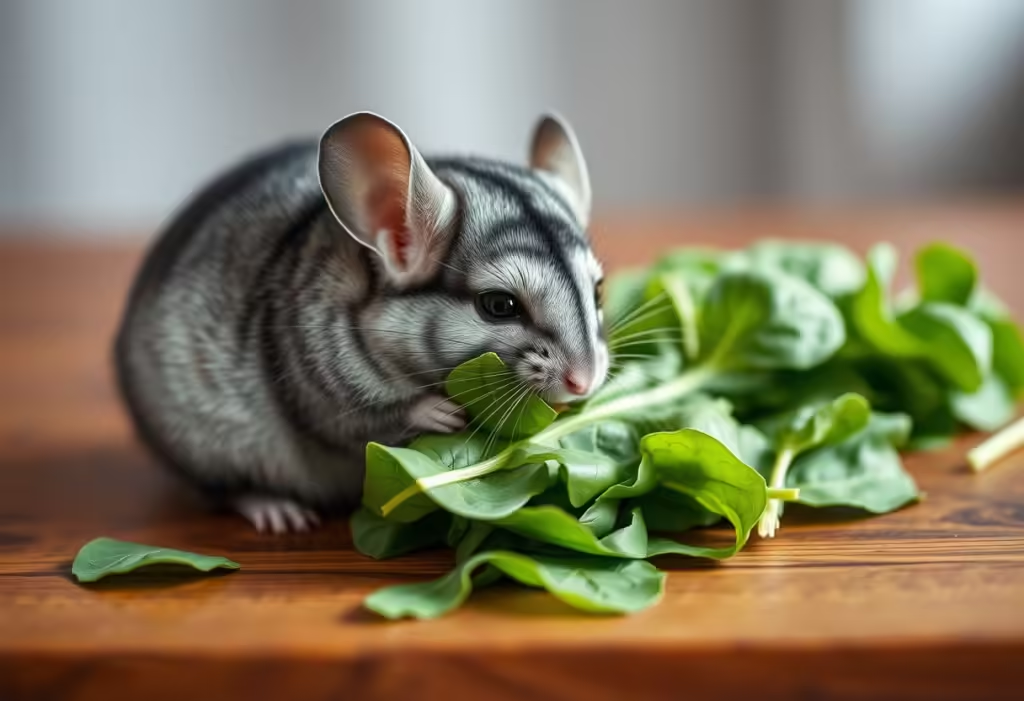No, chinchillas should not eat spinach. Spinach contains high levels of oxalates, which can increase the risk of urinary stones in chinchillas. Additionally, their sensitive digestive systems cannot handle the moisture and fiber content in spinach, making it an unsafe food option. Below, we outline why spinach should be avoided and provide safer alternatives for your pet.
Key Takeaways
- Spinach is not safe: High oxalate levels can lead to urinary stones, and its composition can disrupt digestion.
- Sensitive digestive system: Leafy greens like spinach often cause bloating, diarrhea, or other issues.
- Stick to a balanced diet: Focus on hay, chinchilla-formulated nuggets, and safe treats like dried herbs or specific low-moisture vegetables.

Why Spinach is Harmful to Chinchillas
High Oxalate Levels
Spinach contains significant amounts of oxalates. These compounds bind with calcium and other minerals in the body, potentially leading to:
- Urinary stones: A painful and serious condition in chinchillas.
- Calcium deficiency: Over time, this can weaken bones and teeth.
Unsuitable for Sensitive Digestive Systems
Chinchillas are herbivores with unique digestive systems designed for dry, fibrous foods like hay. Leafy greens like spinach contain too much water and fiber for them to process effectively, resulting in:
- Bloating and gas
- Diarrhea
- Stomach pain
Other Foods to Avoid
Chinchillas are delicate creatures, and several common foods are toxic or unsuitable for their diets. Do not feed chinchillas the following:
| Food | Why It’s Harmful |
|---|---|
| Asparagus | High water content can cause diarrhea. |
| Avocado | Contains fats that are toxic to chinchillas. |
| Peas | High sugar and water disrupt digestion. |
| Cabbage | Causes bloating and gas. |
| Corn | High sugar and low fiber make it unsuitable. |
| Lettuce | Excessive water content leads to diarrhea. |
| Broccoli | Causes bloating and digestive upset. |
| Rhubarb (including leaves) | Highly toxic and can be fatal. |
A Healthy Diet for Chinchillas
To keep your chinchilla healthy and happy, stick to these dietary essentials:
1. Hay
- Fresh, high-quality hay like timothy hay is the cornerstone of a chinchilla’s diet.
- Supports dental health by wearing down continuously growing teeth.
- Provides the fiber necessary for smooth digestion.
2. Chinchilla Nuggets
- Specially formulated nuggets provide essential vitamins and nutrients, such as:
- Vitamin C: Supports immune health.
- Vitamin A: Promotes vision and skin health.
- Vitamin E: Acts as an antioxidant.
- Fiber: Aids in digestion and prevents gastrointestinal issues.
3. Water
- Fresh, clean water should always be available.
4. Safe Treats (in moderation)
- Dried herbs: Such as dandelion or parsley.
- Dried flowers: Like chamomile or calendula.
- Occasional low-sugar fruits: Like a small piece of dried apple.
Introducing New Foods
When adding anything new to your chinchilla’s diet, follow these steps:
- Start small: Introduce a tiny portion of the new food.
- Observe reactions: Watch for signs of digestive upset, such as diarrhea or changes in appetite.
- Adjust gradually: Only increase the portion size if there are no negative reactions.
Final Words
Spinach is not a safe food for chinchillas due to its high oxalate content and unsuitability for their digestive systems. Instead, prioritize a diet of hay, chinchilla-specific pellets, and safe treats to ensure your pet stays healthy. Always research new foods before offering them and consult a veterinarian for guidance if you’re unsure.
FAQ
Q: Can chinchillas eat spinach at all?
A: No, spinach is unsafe for chinchillas due to its high oxalate content, which can cause urinary stones and digestive issues.
Q: What are the best treats for chinchillas?
A: Safe treats include dried herbs, hay-based snacks, and small amounts of dried fruits like apple slices.
Q: What should I do if my chinchilla accidentally eats spinach?
A: Monitor your chinchilla for signs of digestive upset or urinary issues. If symptoms like diarrhea or lethargy occur, consult a veterinarian immediately.
Q: Why are leafy greens harmful to chinchillas?
A: Leafy greens like spinach, lettuce, and cabbage contain too much water and fiber, which can disrupt a chinchilla’s sensitive digestive system.
